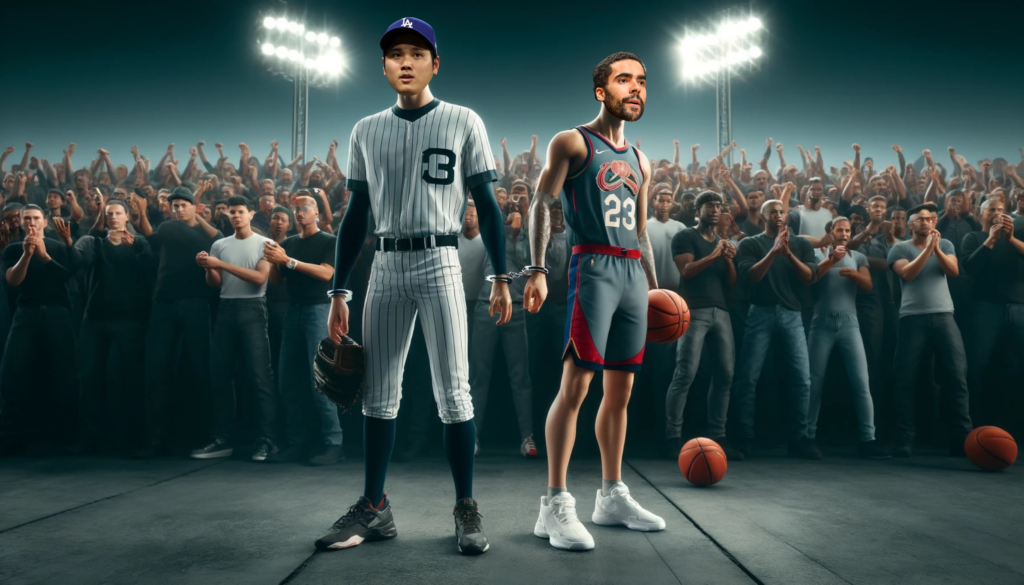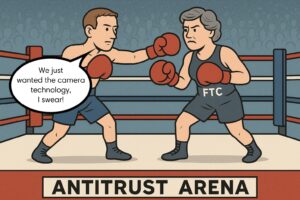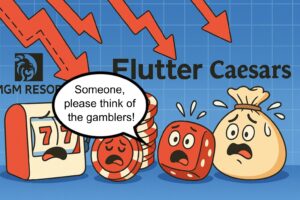This week in the GME3 we’re looking at two high-profile betting scandals in the NBA and MLB, the official launch of Truth Social as a publicly-traded company and the impact it could have on current discourse surrounding social media in the US, and the FTC’s announcement that they will be launching an official investigation into TikTok’s privacy practices. Read on for the full stories!
Gambling
The Other Kind of March Madness
March has been a tumultuous month for sports fans. Not one, but TWO professional sports leagues are currently involved in disputes over sports betting from two high-profile athletes – Los Angeles Dodgers’ pitcher Shohei Ohtani and the Toronto Raptors’ backup centre Jontay Porter.
MLB was the first league hit last week, with Ohtani coming under fire after it was discovered that transfers totalling $1 million had been sent to an illegal gambling ring operating out of Southern California. It was later revealed that Ohtani was not the one who participated in the illegal gambling, instead the debts were incurred by his long-time friend and translator, Ippei Mizuhara.
Initially, it was believed that Ohtani knowingly transferred the money to pay off his friend’s gambling debts. While Mizuhara made it clear Ohtani did not know that the money was owed to an illegal bookie, he did willingly send “eight or nine transfers of $500,000 each” to help Mizuhara pay off his considerable gambling debts.
However, the story has since changed. Ohtani has come out publicly stating that he had no knowledge of Mizuhara’s gambling debts and that the money in question had been stolen from his bank account. Furthermore, Ohtani’s legal representation has accused Mizuhara of abusing his position as translator to control the information the baseball star had access to. Mizuhara has since been fired by the Dodgers. As a result, both MLB and the IRS have opened official investigations into Mizuhara’s actions. Betting on baseball would be a serious infraction here, and Ohtani may be facing a lifetime ban from the sport if he was knowingly involved in gambling.
The NBA was the next sports organization to fall to a gambling scandal this week. Raptors’ centre Jontay Porter has been found to have been involved in some suspicious gambling activity.
A still-anonymous gambler (or gamblers) placed several significant bets on Porter’s individual stats – like points, rebounds, assists, or three-pointers – during two games earlier this March. In both cases, Porter only played a few minutes before exiting the game with a minor injury, leaving the bettors who picked the “under” on Porter’s stats with significant winnings. DraftKings reported that wagers on Porter were among the most profitable in the entire NBA on those nights.
The team has pulled Porter from future games until the league’s investigation into the matter can be finished. If it’s found that he knowingly participated in these activities, he could face fines, suspension, or even contract termination.
With these two high-profile cases happening so close together, experts have been debating the effects that the proliferation of sports betting culture has had on professional sports. Some see gambling as an existential threat to organized sports, and some see these recent issues as inevitable growing pains as the sports industry races to keep up with ever-expanding betting platforms. If you want to hear our colleague Zack Pearlstein’s take on these current events, check out his interview on the topic from CBC Metro Morning HERE!
Media
A New Challenger Approaches!
Former US President Donald Trump’s proprietary social media platform, Truth Social, is officially open for trading on the Nasdaq, and its first day of trading went extremely well, leaving the company with an estimated market value of close to $8 billion.
We’re currently witnessing a rather unique battle of competing interests over social media. American politicians have been seen adopting a more hardline stance against social media, including attempting to ban TikTok and Florida banning children under the age of 14 from creating accounts on popular platforms.
On the other side of the war, we have Truth Social, a company founded on standing against “undue censorship” both from tech giants and the American government. Some investors, like Mark Willis of Indian Trail, North Carolina see this as the main draw of the platform, even going so far as to describe it as “the only social media platform that is not heavily influenced by the government.”
However, other than the (potentially) inflated market value of Truth Social and parent company Trump Media, the company itself doesn’t seem to be too profitable. The company only generated $3.3 million in revenue during the first nine months of last year, all from advertising revenue, and recorded a loss of $49 million at the end of the fiscal year. This means that the $8 billion market value is almost 2,000 times the company’s estimated revenue.
Some are calling Trump Media a “meme stock” – like GameStop or AMC – but only time will tell if Truth Social will end up being successful, or if it’ll go the way of other failed platforms, like MySpace, Friendster, or X.
Entertainment
TikTok Trouble
On the topic of social media regulation, it seems that TikTok just can’t catch a break. In addition to the impending ban working its way through the American legislative system at the moment, now it looks like the FTC will be opening an investigation over the social media company’s privacy and data security practices.
Specifically, the FTC is investigating whether TikTok, and its Beijing-based parent company ByteDance, deceived its users by denying that individuals in China had access to their data.
According to inside sources the FTC will decide in the coming weeks whether they will bring a lawsuit or settlement over the issue. This latest effort shows how different levels of government and regulatory agencies are attempting to reign in the influence of the popular video platform. Whether it’s due to protecting young users, or curbing the power of the Chinese-owned social media company, it seems that the US is determined to regain control.
GME Law is Jack Tadman, Zack Pearlstein, Lindsay Anderson, Daniel Trujillo, and Will Sarwer-Foner Androsoff. Jack’s practice has focused exclusively on gaming law since he was an articling student in 2010, acting for the usual players in the gaming and quasi-gaming space. Zack joined Jack in September 2022. In addition to collaborating with Jack, and with a keen interest in privacy law, Zack brings a practice focused on issues unique to social media, influencer marketing, and video gaming. Lindsay is the most recent addition to the team, bringing her experience as a negotiator and contracts attorney, specializing in commercial technology, SaaS services, and data privacy.
At our firm, we are enthusiastic about aiding players in the gaming space, including sports leagues, media companies, advertisers, and more. Our specialized knowledge in these industries allows us to provide tailored solutions to our clients’ unique legal needs. Reach out to us HERE or contact Jack directly at jack@gmelawyers.com if you want to learn more!
Check out some of our previous editions of the GME3 HERE and HERE, and be sure to follow us on LinkedIn to be notified of new posts, keep up to date with industry news, and more!




